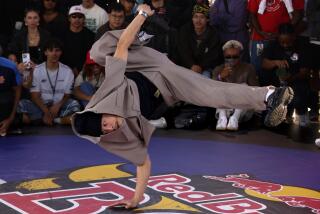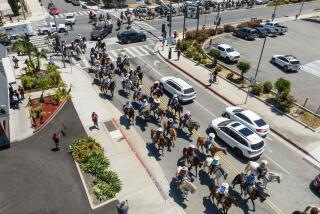Portuguese Bend Show : Medal Finals Event Is Serious Horseplay
- Share via
With riders in black velvet hunt caps and horses with gleaming coats and braided tails, the genteel, yet intensely competitive world of horse shows came to the Palos Verdes Peninsula this weekend.
The occasion was the 31st annual Portuguese Bend National Horse Show, a benefit for Childrens Hospital of Los Angeles. Last year, the show raised more than $100,000 for the hospital.
Today the show at the Empty Saddle Club in Rolling Hills Estates features a $2,500 jumping competition, polo demonstrations, a stagecoach, Welsh ponies and the Long Beach Mounted Police. It also concludes the Pacific Coast Horse Shows Assn. Horsemanship Medal Finals, which began Saturday.
Prestigious Event
The Medal Finals--as the contest is called--is the top competition for equestrians under 14 on the West Coast. Now in its second year, it drew 55 entrants from San Diego to Yorba Linda.
“This is very prestigious,” said Denise Kazarian, horse show co-chairwoman.
Riders are evaluated on form as they negotiate a variety of fences and obstacles in an arena. The winner goes on to the National Horse Show in Madison Square Garden in New York.
Not everyone can enter. Entrants must have placed first in two preliminary competitions during the previous year, with the 100 or so designated events scattered as far north as Calgary in Canada and as far east as Phoenix.
“These kids go all over to find a place to win,” said Kazarian.
Juggling schedules can mean riding in Phoenix for a horse show and then trucking immediately to Sacramento for another show “with a tired and cranky rider,” she said. The worst she recalled was when the horse and rider who won the Portuguese Bend show had to travel across the country to New York in a week.
All the riding around can cut into school time.
“A lot of them don’t go to school,” said Kazarian. “They get tutors.”
‘Very Good Students’
Show manager Robin Serfass said, “Most of the kids are very good students.”
Tutors, trucking, horses, stables, entry fees and other expenses add up fast. Kazarian estimated that it costs about $50,000 a year to ride competitively.
“To make this level, the kids need the dedication, discipline and desire,” said Serfass. “They have very supportive parents, financially and emotionally. It is as demanding as the Olympics.”
In fact, the link to the Olympics is not far-fetched.
One Peninsula horsewoman is Lisa Jacquin, who trains in Rolling Hills Estates and is a member of the U.S. Equestrian Team that is readying for the Olympics in Seoul. In addition, former Rolling Hills resident Joan Scharffenberger, who made the Olympic “long list” (initial selections), rode in the Portuguese Bend show 18 years ago as an 8 year old.
Last year’s winner of the
Medal Finals, who is barred by the rules from entering that competition again, is Emily Esau, a curly haired freckle-faced 14 year old who lives in Olivenhain near San Diego.
Esau is an exception to the general rule that competitive riders come from wealthy families. Her father is a horse trainer and many of her competitive needs--including her horse--have been provided by his job.
She started riding when she was 3 and started competing when she was 4.
On school days, she rides from 3 to 5 p.m. “Usually on weekends, we are at a horse show, so I ride all day long,” she said.
The high point of her equestrian career has been the trip to New York--even though she did not finish in the top 10. “It was neat,” she said.
As far the competition, she said: “I was just there to have fun. I did as well as can be expected. I got around (completed the course). I didn’t make any major mistakes. I didn’t make a fool of myself.”
More to Read
Sign up for The Wild
We’ll help you find the best places to hike, bike and run, as well as the perfect silent spots for meditation and yoga.
You may occasionally receive promotional content from the Los Angeles Times.






